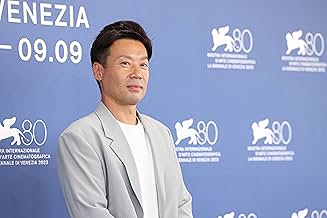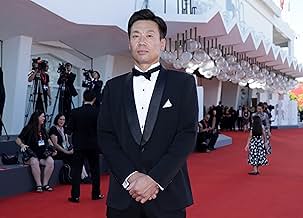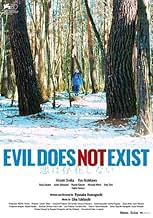Takumi und seine Tochter Hana leben im Dorf Mizubiki in der Nähe von Tokio. Eines Tages werden die Dorfbewohner auf einen Plan aufmerksam, der vorsieht, in der Nähe von Takumis Haus einen Ca... Alles lesenTakumi und seine Tochter Hana leben im Dorf Mizubiki in der Nähe von Tokio. Eines Tages werden die Dorfbewohner auf einen Plan aufmerksam, der vorsieht, in der Nähe von Takumis Haus einen Campingplatz zu errichten.Takumi und seine Tochter Hana leben im Dorf Mizubiki in der Nähe von Tokio. Eines Tages werden die Dorfbewohner auf einen Plan aufmerksam, der vorsieht, in der Nähe von Takumis Haus einen Campingplatz zu errichten.
- Auszeichnungen
- 17 Gewinne & 45 Nominierungen insgesamt
Empfohlene Bewertungen
Ryusuke Hamaguchi's followup to his masterful DRIVE MY CAR confronts the audience with its title but eases the viewer in with a long pastoral credit sequence. Then, an abrupt cut. Hamacuchi and cinematographer Yoshio Kitagawa do this a few times during the movie, as if jarring the viewer to pay attention.
Takumi (Hitoshi Omika) is a local jack of all trades in a small secluded Japanese mountain village. He lives his daughter, Hana (Ryo Nishikawa). Takumi and his circle of friends are happy with their quiet life, but their tranquility is threatened when a large firm decides to build a glamping (glamour camping) development in the area. The company is so large that when they hold a town meeting, they outsource the task to a pair of publicists (Ryuji Kosaka and Ayaka Shibutani) - further alienating the residents.
Writer-Director Hamaguchi isn't so much interested in the nuts and bolts aspects (although that meeting amusingly delves deeply into such details as sewerage), as setting up a parable about man and nature. Hamaguchi meticulously reveals how even one small change to the Eco system can upset the natural order and balance of life.
This isn't to say that Hamaguchi completely abandons the fine tuned dialogue that made DRIVE MY CAR so indelible. There's an extended sequence when the two corporate flacks have a lengthy and fascinating personal discussion as they drive out to try and offer Takumi a role in the glamping scheme. The one significant critique here is that the movie does strain a bit in trying to make its argument. Hamaguchi has said that he began the project as a half hour dialogue free short subject. The seams do show. Still, the filmmaking is top notch and the mostly amateur cast gives it a grounded reality no matter how high-minded the themes get. The finale is devastating and will stay with you long after the fade-out.
Takumi (Hitoshi Omika) is a local jack of all trades in a small secluded Japanese mountain village. He lives his daughter, Hana (Ryo Nishikawa). Takumi and his circle of friends are happy with their quiet life, but their tranquility is threatened when a large firm decides to build a glamping (glamour camping) development in the area. The company is so large that when they hold a town meeting, they outsource the task to a pair of publicists (Ryuji Kosaka and Ayaka Shibutani) - further alienating the residents.
Writer-Director Hamaguchi isn't so much interested in the nuts and bolts aspects (although that meeting amusingly delves deeply into such details as sewerage), as setting up a parable about man and nature. Hamaguchi meticulously reveals how even one small change to the Eco system can upset the natural order and balance of life.
This isn't to say that Hamaguchi completely abandons the fine tuned dialogue that made DRIVE MY CAR so indelible. There's an extended sequence when the two corporate flacks have a lengthy and fascinating personal discussion as they drive out to try and offer Takumi a role in the glamping scheme. The one significant critique here is that the movie does strain a bit in trying to make its argument. Hamaguchi has said that he began the project as a half hour dialogue free short subject. The seams do show. Still, the filmmaking is top notch and the mostly amateur cast gives it a grounded reality no matter how high-minded the themes get. The finale is devastating and will stay with you long after the fade-out.
Ryûsuke Hamaguchi's Evil Does Not Exist is a very slow burn of a film, a character study disguised as an eco-drama. Nestled in the serene Mizubiki Village, a community thrives on a deep connection to nature. Their tranquility is shattered by the arrival of slick Tokyo suits proposing a glamping resort-a luxurious "escape" to nature for city dwellers. What follows is a clash of values, a meditation on the complexities of progress, and the blurry line between good and evil.
Hamaguchi doesn't hit us over the head with environmental messages. Instead, he lets the beauty of the Japanese countryside speak for itself. Lush forests and tranquil rivers become characters, a stark contrast to the sterile, neon-lit world the city reps represent. This visual poetry is amplified by the film's score, a melancholic blend of strings and woodwinds that perfectly captures the tension between tradition and modernity.
The acting is understated, mirroring the film's pacing. Hitoshi Omika, as Takumi, the gruff but conflicted villager, delivers a nuanced performance. We see his internal struggle-the fear of change wrestling with the desire to protect his way of life. The Tokyo reps, played by Ryô Nishikawa and Ryûji Kosaka, are initially portrayed as villains, all smiles and empty promises. However, as the film progresses, their own vulnerabilities peek through, reminding us that there's rarely a clear-cut bad guy in real life.
The plot of Evil Does Not Exist unfolds deliberately, sometimes feeling glacial. There are long stretches of dialogue that, while beautifully written, could test the patience of viewers expecting a more action-oriented film. The ending, too, occurs at a point where there is no resolution to the story, leaving us to scratch our heads wondering what might happen rather than being told. But there is a reason for this. By ending the movie (but not the story) in this way, Hamaguchi forces us to confront our own perspectives on the story, a tactic that might backfire for those seeking easy answers. There aren't any.
This won't be a film for everyone. Forget it if you want a fast-paced thriller. You will be disappointed. However, if you appreciate slow cinema and nuanced character studies, Evil Does Not Exist offers a rewarding experience. While the untranslated credits rolled, I just sat there, reflecting on our relationship with nature, the allure of progress, and the shades of grey that exist between good and evil. If you enjoyed contemplative films like Burning or Drive My Car (I enjoyed Evil Does Not Exist more), Evil Does Not Exist is definitely worth a watch. Just be prepared for a slow burn and an ending that will leave you pondering.
Hamaguchi doesn't hit us over the head with environmental messages. Instead, he lets the beauty of the Japanese countryside speak for itself. Lush forests and tranquil rivers become characters, a stark contrast to the sterile, neon-lit world the city reps represent. This visual poetry is amplified by the film's score, a melancholic blend of strings and woodwinds that perfectly captures the tension between tradition and modernity.
The acting is understated, mirroring the film's pacing. Hitoshi Omika, as Takumi, the gruff but conflicted villager, delivers a nuanced performance. We see his internal struggle-the fear of change wrestling with the desire to protect his way of life. The Tokyo reps, played by Ryô Nishikawa and Ryûji Kosaka, are initially portrayed as villains, all smiles and empty promises. However, as the film progresses, their own vulnerabilities peek through, reminding us that there's rarely a clear-cut bad guy in real life.
The plot of Evil Does Not Exist unfolds deliberately, sometimes feeling glacial. There are long stretches of dialogue that, while beautifully written, could test the patience of viewers expecting a more action-oriented film. The ending, too, occurs at a point where there is no resolution to the story, leaving us to scratch our heads wondering what might happen rather than being told. But there is a reason for this. By ending the movie (but not the story) in this way, Hamaguchi forces us to confront our own perspectives on the story, a tactic that might backfire for those seeking easy answers. There aren't any.
This won't be a film for everyone. Forget it if you want a fast-paced thriller. You will be disappointed. However, if you appreciate slow cinema and nuanced character studies, Evil Does Not Exist offers a rewarding experience. While the untranslated credits rolled, I just sat there, reflecting on our relationship with nature, the allure of progress, and the shades of grey that exist between good and evil. If you enjoyed contemplative films like Burning or Drive My Car (I enjoyed Evil Does Not Exist more), Evil Does Not Exist is definitely worth a watch. Just be prepared for a slow burn and an ending that will leave you pondering.
This surreal 2023 film by Hanaguchi, begins as a straight narrative begining with opening micro/macro shots of Japanese landscape. It focused on a young village situated by rivers which becomes a possible site for Toyko's tourist industry.
It follows rural villagers who are not right with the recent interest of their surroundings by outsiders. During a planning session between them and reps from the tourist company, they learned that a Toyko based firm wants to create a "glamping" vacation site for urban trotters.
Things begin to clash between reps and the locals. The representatives reach back to Tokyo office who assigns them to interact more with villagers, how to learn from them. A direct and humble interaction of Toyko reps and locals ensues.
The rest of the story, evolves a beautiful piece of surrealism. Playing with subtleties with useful shots of the natural landscape match with the notion of what is evil. It's the corporate greed, and it's reluctance to understand basic principles of life without business interest.
Obviously these topics are designed within a Japanese cultural context, the average movie viewers will probably miss the clues or references leading up to an very questionable climax - what just happened. Supposedly this was the subjective outcome desired by the film's director.
The film's director (Hanaguchi) had an open ended situation for viewers' interpretations. This film tackles alot of allegorical symbols, within the nature of the woods and the human behaviour.
It follows rural villagers who are not right with the recent interest of their surroundings by outsiders. During a planning session between them and reps from the tourist company, they learned that a Toyko based firm wants to create a "glamping" vacation site for urban trotters.
Things begin to clash between reps and the locals. The representatives reach back to Tokyo office who assigns them to interact more with villagers, how to learn from them. A direct and humble interaction of Toyko reps and locals ensues.
The rest of the story, evolves a beautiful piece of surrealism. Playing with subtleties with useful shots of the natural landscape match with the notion of what is evil. It's the corporate greed, and it's reluctance to understand basic principles of life without business interest.
Obviously these topics are designed within a Japanese cultural context, the average movie viewers will probably miss the clues or references leading up to an very questionable climax - what just happened. Supposedly this was the subjective outcome desired by the film's director.
The film's director (Hanaguchi) had an open ended situation for viewers' interpretations. This film tackles alot of allegorical symbols, within the nature of the woods and the human behaviour.
In a way it starts very cleverly with very slow nature scenes, illustrating how closely connected these people are to their natural surroundings, how they live off and in harmony with the land. They gather wood for heating, they collect spring water for drinking and cooking, they recharge by walking long distances and admiring the stunning beauty of the surroundings, they memorize the different trees, they look out for wild animals, they help each other.
And then Hamaguchi is the perfect director to create a scene showing a public gathering with public speakers and audience interaction. He did a lengthy scene in Happy Hour as well. He can create meaningful dialogue with stand-out lines. And quite a bit of tension. And we move to the theme of capitalism corrupting everything in its path, with no regard for the destruction it leaves behind. It's facts, figures, stats, consultant advice, bending the law and using it to your advantage. The waste of five people is still below the accepted limit of pollution. It's better than city water anyway.
Then we dig deeper into the struggles of the glamping company workers, who are caught between empathizing with the locals and working for a man who wants to make money. He is not exactly a ruthless money man, he is actually trying to run a profitable business and sees the bottom line. The advisor is the cynical one. But the director takes the advice to heart. The funds are received and partially spent, he can't back down.
And then there's the enigmatic Takumi, the quiet, but trusted lumberjack, or jack of all trades and the poor hapless Takahashi, the former talent agent who experiences a sudden urge to commune with nature.
Slow start that kind of makes sense in the grand scheme of things, but it still tests your patience, and indeed a very odd, somewhat upsetting and inexplicable ending. The middle part is sublime but the rest didn't quite gel well together.
I read the director's explanation, but it's still not coming through in my opinion.
And then Hamaguchi is the perfect director to create a scene showing a public gathering with public speakers and audience interaction. He did a lengthy scene in Happy Hour as well. He can create meaningful dialogue with stand-out lines. And quite a bit of tension. And we move to the theme of capitalism corrupting everything in its path, with no regard for the destruction it leaves behind. It's facts, figures, stats, consultant advice, bending the law and using it to your advantage. The waste of five people is still below the accepted limit of pollution. It's better than city water anyway.
Then we dig deeper into the struggles of the glamping company workers, who are caught between empathizing with the locals and working for a man who wants to make money. He is not exactly a ruthless money man, he is actually trying to run a profitable business and sees the bottom line. The advisor is the cynical one. But the director takes the advice to heart. The funds are received and partially spent, he can't back down.
And then there's the enigmatic Takumi, the quiet, but trusted lumberjack, or jack of all trades and the poor hapless Takahashi, the former talent agent who experiences a sudden urge to commune with nature.
Slow start that kind of makes sense in the grand scheme of things, but it still tests your patience, and indeed a very odd, somewhat upsetting and inexplicable ending. The middle part is sublime but the rest didn't quite gel well together.
I read the director's explanation, but it's still not coming through in my opinion.
The opening shot is mesmerising, disorientating, as Yoshio Kitagawa's camera pans under the tree tops to Eiko Ishibashi's haunting score. The start of Ryusuke Hamaguchi's "Evil Does Not Exist" reminds of Bela Tarr's "Satantango" (1994), with a slow-moving, natural, extended take. Not as extreme, but it sets the tone for what comes next.
Mizubiki village is a quiet mountain town a manageable drive from Tokyo. A minor holiday destination, investors want to set-up a glamping site, which naturally meets resistance from the locals. Takumi (Hitoshi Omika), a local odd-job man is cautious, but willing to meet the proposals halfway if they take the local environment into consideration.
Takahashi (Ryuji Kosaka) and Mayuzumi (Ayaka Shibutani) are the employees tasked with meeting the locals and convincing them of the project. Sympathetic to their hosts, they are people doing a job they don't necessarily believe in, and so are neither one thing or the other. Seeming to connect with Takumi, they feel a solution can be reached, but the reality is they are met with contempt from both sides.
Straightaway this enraptures you and you are immediately drawn into the small village and its humble ways. The brilliance of nature is emphasised throughout, and the opening moments show this perfectly. And as Takahashi and Mayuzumi try to deliver the initial presentation, key members of the community voice the importance of the environment on their health, community, work and business.
The last of these is the only focus the glamping project has in mind, thinking of the pretty landscape, and not the impact a modern resort will have on it. As Alex Kerr emphasises in his book "Hidden Japan," once you have been somewhere, you've already ruined it. The village elder (Taijiro Tamura) puts his point across succinctly: those living upstream must think of their impact on those downstream.
Often, I've found Hamaguchi's films, while good, can feel a little awkward. Characters and their interactions can feel wooden (perhaps due to his use of novice actors) and their motivations hard to grasp. "Drive My Car" (2021) was a step-up for him, and "Evil Does Not Exist" is by far his strongest in its script. It feels tighter, with arguments better put forward, in both the initial presentation and Takahashi and Mayuzumi's drive back to the village, where they share their career decisions. It is much more natural, though Takahashi's sudden desire to change careers may be a bit much for some.
Takumi's daughter Hana (Ryo Nishikawa) is a key character, but perhaps from the standard use of a young girl to represent pure innocence. The true star of the film is the forest of its setting and the film's true lasting memory, working in unison with the soundtrack.
The title of the film is enigmatic, as is the atmosphere throughout. The isolation of the forest community, and their connection to nature, show an innocence. But clear in their desires, they show they will fight to keep what's theirs. Takahashi and Mayuzumi may be the face of the more sinister corporate body behind them, but also show themselves to be useless pawns, simply carrying out their job.
Is simple self-sufficiency more noble than misguidedly following orders from above for profits? The ending confuses this question, its incompleteness difficult to process. The real question is whether it is better to do bad to protect what you believe in, rather than trying to diplomatically do something you don't believe in out of expectation. Silence is complicit.
The forest is deep, and it's easy to lose yourself.
Politic1983.home.blog.
Mizubiki village is a quiet mountain town a manageable drive from Tokyo. A minor holiday destination, investors want to set-up a glamping site, which naturally meets resistance from the locals. Takumi (Hitoshi Omika), a local odd-job man is cautious, but willing to meet the proposals halfway if they take the local environment into consideration.
Takahashi (Ryuji Kosaka) and Mayuzumi (Ayaka Shibutani) are the employees tasked with meeting the locals and convincing them of the project. Sympathetic to their hosts, they are people doing a job they don't necessarily believe in, and so are neither one thing or the other. Seeming to connect with Takumi, they feel a solution can be reached, but the reality is they are met with contempt from both sides.
Straightaway this enraptures you and you are immediately drawn into the small village and its humble ways. The brilliance of nature is emphasised throughout, and the opening moments show this perfectly. And as Takahashi and Mayuzumi try to deliver the initial presentation, key members of the community voice the importance of the environment on their health, community, work and business.
The last of these is the only focus the glamping project has in mind, thinking of the pretty landscape, and not the impact a modern resort will have on it. As Alex Kerr emphasises in his book "Hidden Japan," once you have been somewhere, you've already ruined it. The village elder (Taijiro Tamura) puts his point across succinctly: those living upstream must think of their impact on those downstream.
Often, I've found Hamaguchi's films, while good, can feel a little awkward. Characters and their interactions can feel wooden (perhaps due to his use of novice actors) and their motivations hard to grasp. "Drive My Car" (2021) was a step-up for him, and "Evil Does Not Exist" is by far his strongest in its script. It feels tighter, with arguments better put forward, in both the initial presentation and Takahashi and Mayuzumi's drive back to the village, where they share their career decisions. It is much more natural, though Takahashi's sudden desire to change careers may be a bit much for some.
Takumi's daughter Hana (Ryo Nishikawa) is a key character, but perhaps from the standard use of a young girl to represent pure innocence. The true star of the film is the forest of its setting and the film's true lasting memory, working in unison with the soundtrack.
The title of the film is enigmatic, as is the atmosphere throughout. The isolation of the forest community, and their connection to nature, show an innocence. But clear in their desires, they show they will fight to keep what's theirs. Takahashi and Mayuzumi may be the face of the more sinister corporate body behind them, but also show themselves to be useless pawns, simply carrying out their job.
Is simple self-sufficiency more noble than misguidedly following orders from above for profits? The ending confuses this question, its incompleteness difficult to process. The real question is whether it is better to do bad to protect what you believe in, rather than trying to diplomatically do something you don't believe in out of expectation. Silence is complicit.
The forest is deep, and it's easy to lose yourself.
Politic1983.home.blog.
Wusstest du schon
- WissenswertesIn an interview with "The Los Angeles Times" published on May, 2, 2024, director Ryûsuke Hamaguchi decided to cast Hitoshi Omika as the lead role after Omika spent much time driving Hamaguchi around to rural locations in Japan to pick out locations to film for the director's concert film "Gift". This somewhat mirrored the plot of Hamaguchi's "Drive My Car".
- SoundtracksFether
composed by Eiko Ishibashi
Top-Auswahl
Melde dich zum Bewerten an und greife auf die Watchlist für personalisierte Empfehlungen zu.
- How long is Evil Does Not Exist?Powered by Alexa
Details
Box Office
- Bruttoertrag in den USA und Kanada
- 831.685 $
- Eröffnungswochenende in den USA und in Kanada
- 42.752 $
- 5. Mai 2024
- Weltweiter Bruttoertrag
- 3.261.306 $
- Laufzeit
- 1 Std. 46 Min.(106 min)
- Farbe
- Sound-Mix
- Seitenverhältnis
- 1.66 : 1
Zu dieser Seite beitragen
Bearbeitung vorschlagen oder fehlenden Inhalt hinzufügen













